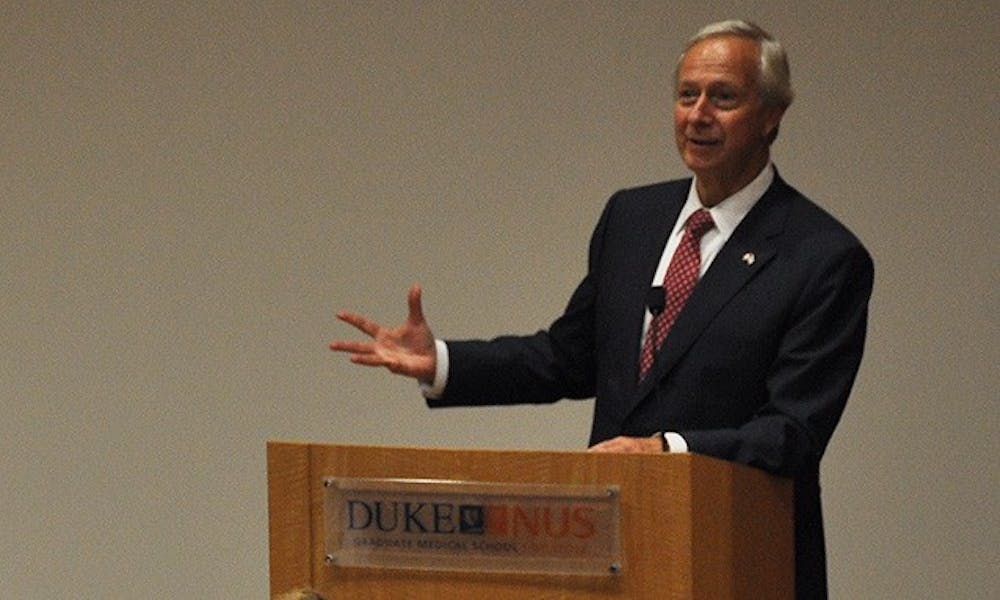As Duke expands its international parameters, the Office of Undergraduate Admissions is evaluating a more global applicant pool.
In recent years, Duke admissions has seen a rise in international applicants. This year was no different as the number of international early decision applicants for the Class of 2016 increased by 8 percent from last year, accounting for 11 percent of the total applicant pool. Administrators attribute the surge mainly to the University’s increased global visibility, as well as expanded international recruiting efforts.
“The surge in [international] applications is consistent with Duke’s efforts outside of the admissions office to be a globalized institution, and it is a natural result of Duke spreading its bounds,” said Anne Sjostrom, associate director of international undergraduate admissions.
Dean of Undergraduate Admissions Christoph Guttentag was not available for comment.
With 142 students representing 55 countries—12 percent of the total enrolled class—the Class of 2015 is one of the most diverse Duke has seen, Sjostrom noted. The top five countries to send applications for the Class of 2015 were China, South Korea, Canada, Singapore and India. Duke’s international recruitment numbers are on par with those of similarly competitive institutions, she added.
In recent years, Duke and other American universities have increased their recruiting efforts for students from outside the United States, at both international and national schools, Sjostrom noted. International schools often have college-counseling resources and financial stability similar to schools in the United States. Students at national schools in other countries, however, might have a harder time simply finding out about Duke, she added.
“We have continued to value and appreciate applicants from international institutions who have ample resources to apply to U.S. colleges while at the same time, paying attention to those students who attend local schools and may not know as much,” she said, noting that some students may never visit before committing and arriving at Duke their freshman year.
One of the most effective methods in increasing awareness of Duke has been word of mouth, added Michael Schoenfeld, vice president for public affairs and government relations.
Freshman Florian Craan—the only member of the Class of 2015 from Haiti—said he had first heard about Duke from classmates and Duke alumni.
“Prospective students learn much more about Duke and its culture through current students and International Ambassadors who can attest through their positive experiences directly,” Schoenfeld added.
One disadvantage Duke has compared to its peer institutions is its slim international alumni network, a result of its shorter international history, Sjostrom noted.
Schoenfeld added that administrators not only have the responsibility of spreading Duke’s reputation but also that of the Durham community while recruiting.
“We have a steeper hill than other institutions in major cities in describing the rich culture we have in Durham, North Carolina, which would seem like a mystery to many prospective students,” he said.
Schoenfeld said recent international visits made by administrators and the men’s basketball team have played a major role in extending Duke’s visibility abroad.
Freshman Xu Rui, who graduated from the Raffles Institution—a school in Singapore that submits the third highest number of Duke applications of any high school worldwide—said interest in Duke among Singapore high school students has surged due to the successes of the Duke-National University of Singapore Graduate Medical School. Rui added that even though more people are aware of Duke and its reputation because of Duke-NUS, the quality of the undergraduate program is still obscure among the general population.
“Many people have the impression that you should only apply to Duke [as an undergraduate] if you intend to do medicine,” Rui said.
In June, President Richard Brodhead visited various countries—including London, China, Singapore, Tanzania and Uganda—hoping to emphasize Duke’s global connections. Brodhead spoke to prospective students at the Raffles Institution while in Singapore.
Frieda Dietrich, college counselor at the Singapore American School—another well-known institution, which supplies a steady flow of international applicants—said more high school students in Singapore are becoming interested in applying to Duke.
“Professors from Duke have been good in reaching out and responding to student inquiries, which goes a long ways in building goodwill with prospective students,” Dietrich wrote in an email Sunday.
Sjostrom noted that as Duke has become more competitive internationally, administrators now have the greater challenge of the yield rate of international students.
As the number of international students increases, it helps to build a diverse student body, she said, noting that global recruitment may become less of a priority in the near future.
“How international do we want to get?” she said. “We may be forced to confront that question.”
Get The Chronicle straight to your inbox
Signup for our weekly newsletter. Cancel at any time.

